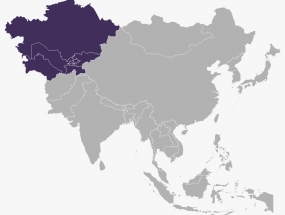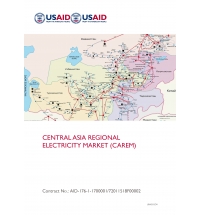USAID/Technical Assistance in Support of Central Asia Regional Electricity Market (CAREM)
Client: Tetra Tech ES, INC. (USA), USAID
Type: Project
Finishing date: August 2021 (March 2022)
Team: Zoran Nesovanovic – Project Manager, D. Orlic, N. Jovic, P. Miksa, M. Stojanovic, D. Vlaisavljevic
The Central Asia Regional Electricity Market (CAREM) is a 3-year project providing technical assistance and capacity building to all five partnering Central Asian (CA) countries (Kazakhstan, Turkmenistan, Tajikistan, Kyrgyzstan, Uzbekistan) in their efforts to create and operate a modern, open and competitive regional power system. In addition, project objective also comprises contribution to energy security enhancement, promotion of economic growth, commercial trade transactions facilitation, attraction of private investment into the power sector of all CA countries, and allowing for greater energy trade between Central Asia and some countries in South Asia.
The project will aim to achieve three objectives:
- a) Support Central Asian countries to improve the technical condition of their transmission infrastructure, and to integrate the operation of all power systems.
- b) Provide technical assistance to Central Asian countries to implement electricity sector reforms, and
- c) Support Central Asian countries to increase their cross-border electricity trade.
The scope included: review of the existing system expansion plans, evaluate the degree of preparedness of each system for parallel operation, and to what extent national regulations facilitate cross border trade; evaluate existing agreements for the interconnection normal operation, system emergencies, existing communication arrangements (including SCADA) and metering schemes for cross border energy accounting; recommendations on the modifications to national regulations to avoid limitations to bilateral electricity trade; Review national Grid Codes and transmission operating practices and recommend changes to support Regional Electricity Market (REM); technical assistance to help countries to implement the necessary measures to be able to participate in the REM; review the already-defined requirements for the hardware and software the CDC will need to plan for and supervise the operation of the CAPS.
Provide assistance in conducting a complete power system steady-state analysis and dynamic stability of the national transmission systems of each Central Asian country, and the interconnected regional transmission grid made up of the five national transmission systems. The model closely reflects the existing topology of the bulk 500kV and 220kV transmission system, including all generation stations, as well as a subset of the most important 110kV transmission lines. Committed new transmission links and upgrades, are simulated as part of separate scenarios. Based on the results of the analyses, implementable solutions to strengthen the power system (on a country by country basis) are recommended, as well as improvements of the individual systems parallel operation.
Assessment of the expected technical benefits of the integrated operation of all Central Asian transmission systems. Assistance in developing the concept of the regional market, balancing market and the competitive procurement of the ancillary services with methodology for remunerating providers. Training sessions provided on
- current best practices for operating modern transmission systems, as well as workshops on specific topics of interest to the region as defined by CAREM
- strengthen the CDC’s technical capabilities to support the implementation of a new and efficient integrated operation
- best practices in electricity sector governance to achieve compliance with proposed regional electricity sector reforms
- electricity markets operation.
Type of services provided:
- Transmission system expansion plans review and preparation
- Interconnection operations rules and procedures evaluation and preparation
- SCADA, Communication and metering schemes review and enhancement
- Grid Code review and amendments
- Regional Coordination Centres HW and SW review and recommendations for improvements
- Power system steady state and dynamic analysis
- Assessment of the technical benefits of the interconnected power system operations
- Workshops and trainings aiming at regional coordination centre and national TSOs capacity building


